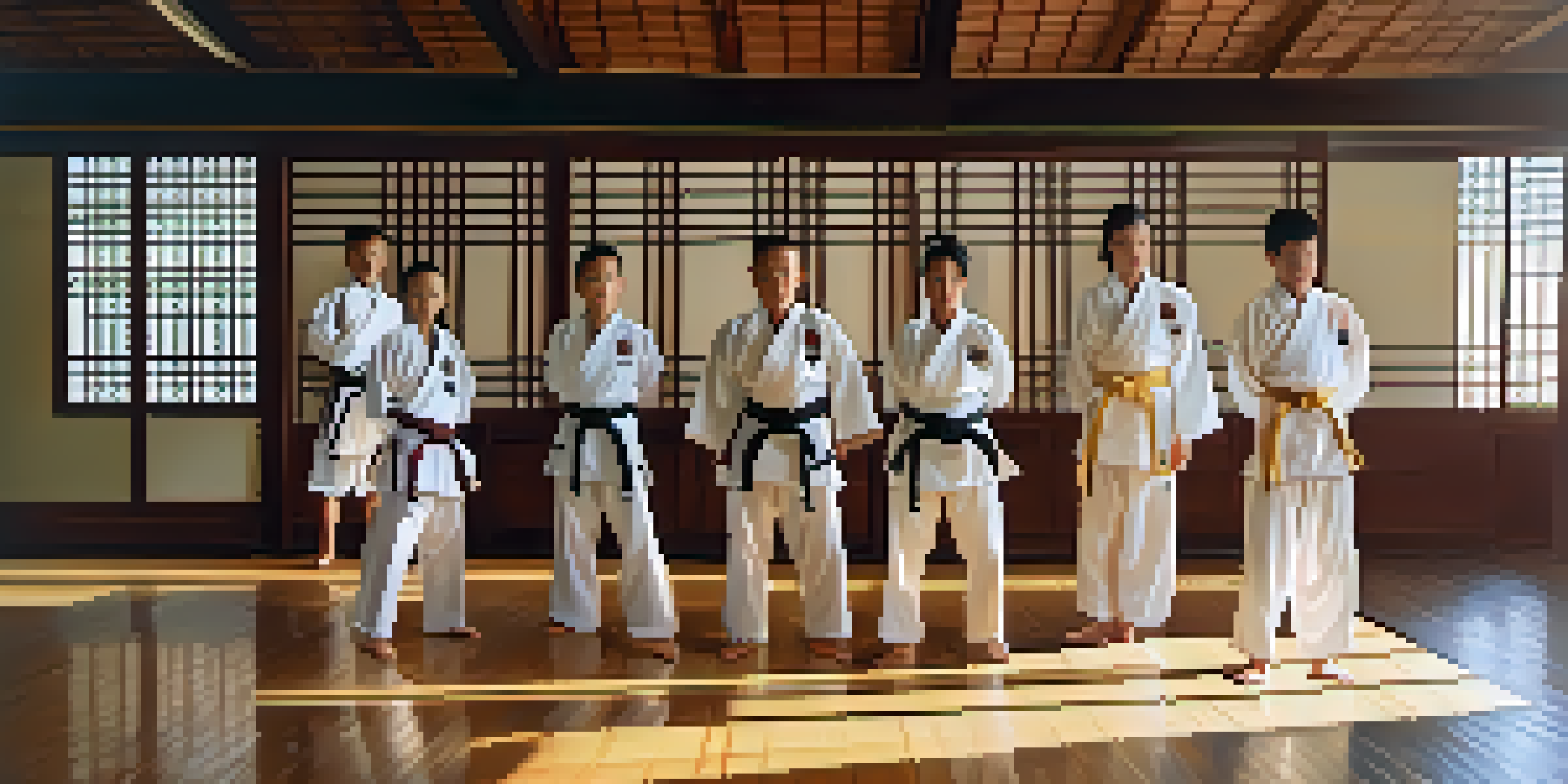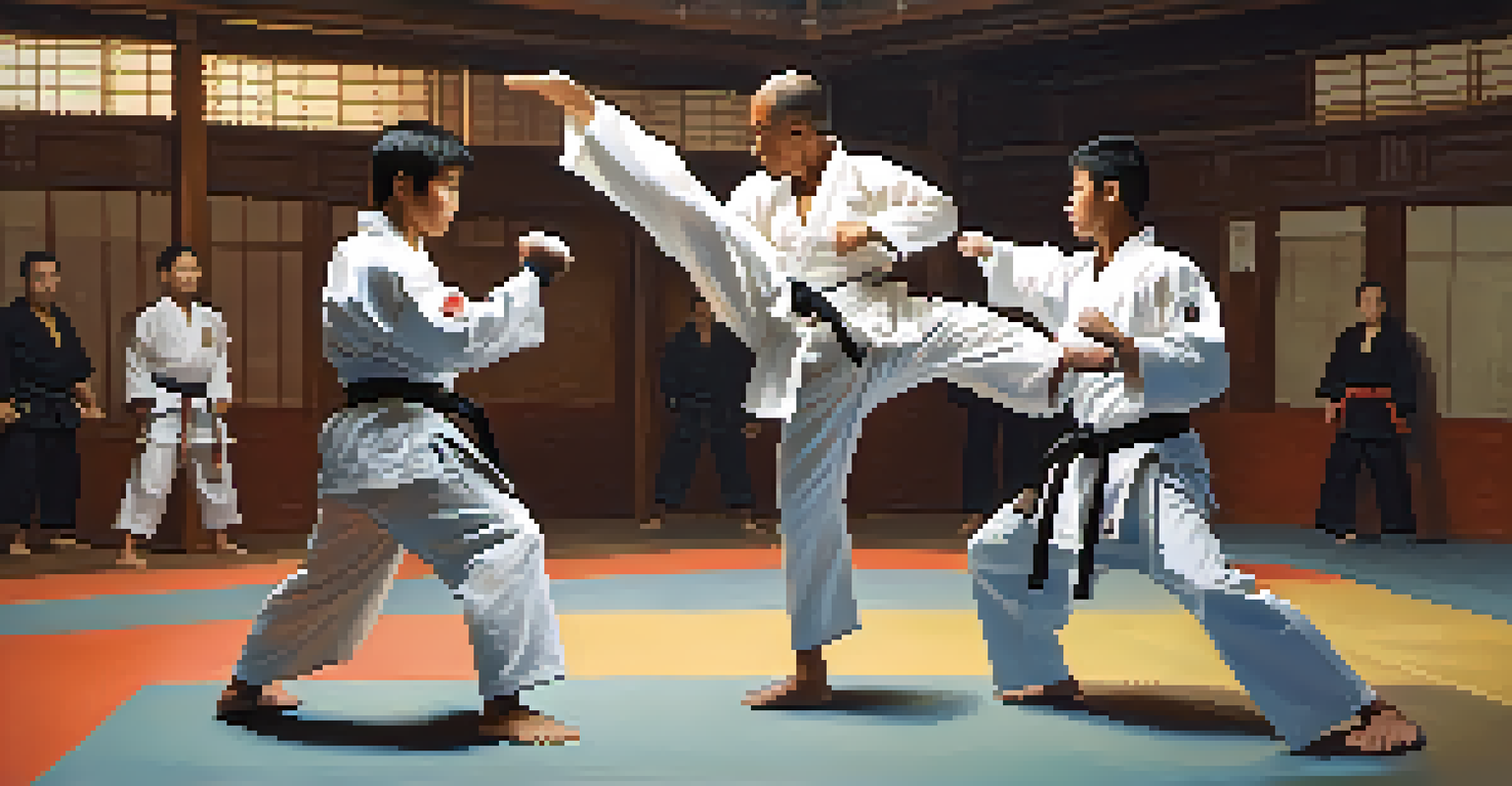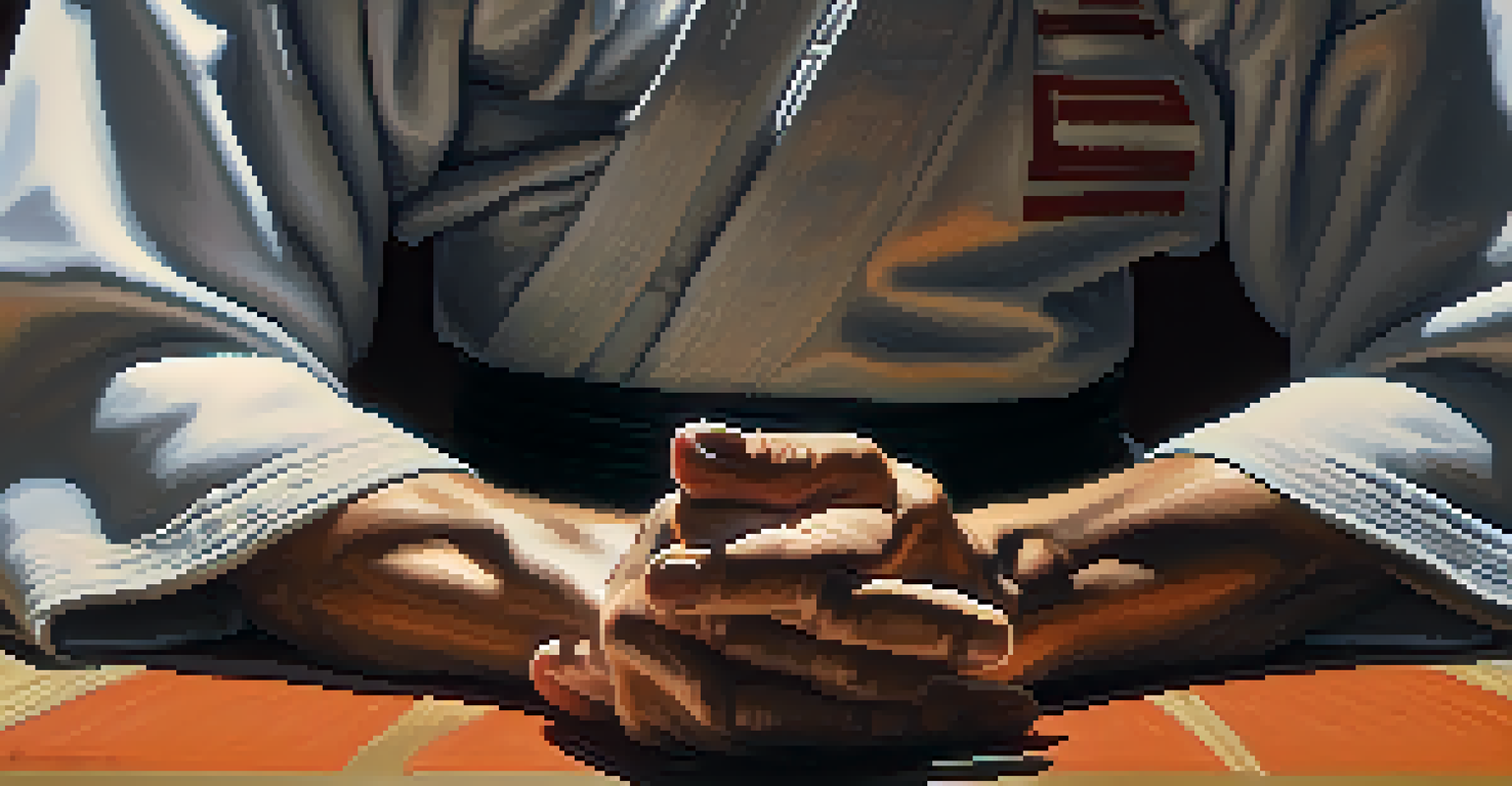Self-Confidence and Emotional Intelligence in Martial Arts

Understanding Self-Confidence in Martial Arts
Self-confidence is the belief in one's abilities and judgment. In martial arts, practitioners develop this trait through consistent practice and overcoming challenges. Each technique learned and sparring session can bolster a student's belief in themselves, making them more resilient both on and off the mat.
Self-confidence is the first requisite to great undertakings.
As students progress, they often set and achieve personal goals, which further enhances their self-esteem. This journey of mastery not only empowers them physically but also instills a sense of accomplishment. In the world of martial arts, self-confidence is not just about fighting skills; it's about believing you can achieve what you set out to do.
Moreover, the supportive environment of a dojo plays a crucial role in fostering self-confidence. Instructors and peers encourage each other, creating a community where individuals feel safe to take risks and learn from their mistakes. This nurturing atmosphere enables students to grow in confidence and face life's challenges head-on.
Emotional Intelligence: A Key Component
Emotional intelligence (EI) refers to the ability to recognize and manage our own emotions while understanding the emotions of others. In martial arts, EI is crucial as practitioners learn to stay calm under pressure and respond effectively to their opponents. This skill translates beyond the dojo, impacting personal and professional relationships.

Through practices like sparring and kata, martial artists develop empathy and awareness. They learn to read body language and emotions, which helps them anticipate actions and reactions. This heightened sensitivity not only enhances their martial arts skills but also fosters deeper connections with others.
Self-Confidence Shapes Resilience
Practicing martial arts fosters self-confidence, empowering students to face challenges both on and off the mat.
Moreover, martial arts often teach conflict resolution techniques, reinforcing the importance of emotional regulation. Students discover that responding thoughtfully rather than impulsively can lead to better outcomes in both physical and emotional confrontations. This understanding is vital for personal growth and navigating social dynamics.
The Intersection of Self-Confidence and EI
Self-confidence and emotional intelligence are deeply intertwined in martial arts. As students become more confident in their abilities, they also grow more aware of their emotions and those of others. This synergy allows them to approach challenges with a balanced mindset, leading to better decision-making.
Emotional intelligence is not the opposite of intelligence; it is not the triumph of heart over head—it is the unique intersection of both.
For example, a confident martial artist is more likely to manage stress effectively, allowing them to face opponents without fear. Conversely, those with high emotional intelligence can maintain composure, ensuring that their confidence does not turn into arrogance. This balance is essential for both competitive success and personal development.
Furthermore, the blend of these two qualities fosters effective leadership. Practitioners who exude self-confidence while demonstrating empathy can inspire others, whether in the dojo or in everyday life. This ability to lead with both strength and sensitivity is a hallmark of a true martial artist.
Building Self-Confidence Through Training
Training in martial arts is a progressive journey that builds self-confidence step by step. From the first lesson, students are introduced to techniques that challenge their physical and mental limits. Each small victory, whether mastering a new move or successfully executing a sparring session, contributes to a growing sense of self-assurance.
Additionally, martial arts training often emphasizes the importance of discipline and perseverance. As students commit to regular practice, they learn the value of hard work, which reinforces their belief in their capabilities. This mindset is not only applicable to martial arts but also translates to other areas of life, including academics and careers.
Emotional Intelligence Enhances Skills
Emotional intelligence developed through martial arts helps practitioners manage emotions and improve interpersonal relationships.
Moreover, instructors play a pivotal role in this process by providing constructive feedback and encouragement. A good instructor recognizes individual strengths and areas for improvement, helping students navigate their unique paths to self-confidence. This mentorship fosters a supportive environment where students feel empowered to push their limits.
Emotional Intelligence Development in Sparring
Sparring is a critical aspect of martial arts that significantly enhances emotional intelligence. It’s here that students learn to manage their emotions in real-time, dealing with the adrenaline and stress that accompany physical confrontations. This experience teaches them to remain calm and focused, even when faced with unexpected challenges.
During sparring, practitioners also develop empathy as they learn to read their opponents' reactions and emotions. Understanding how another person feels can guide their responses, allowing for more strategic and respectful interactions. This skill is invaluable, fostering a deep sense of respect and camaraderie within the martial arts community.
Furthermore, sparring provides a safe environment to experience and process emotions such as fear, frustration, and excitement. By navigating these feelings, martial artists gain insights into their emotional triggers, leading to greater self-awareness. This understanding is fundamental in cultivating emotional intelligence both on and off the mat.
The Role of Mindfulness in Martial Arts
Mindfulness is the practice of being fully present in the moment, and it plays an essential role in martial arts training. By cultivating mindfulness, practitioners enhance both their self-confidence and emotional intelligence. This focus helps them be aware of their thoughts and feelings, facilitating a deeper connection with their training.
Incorporating mindfulness techniques, such as meditation and breath control, allows martial artists to calm their minds before competitions or challenging sparring sessions. This mental clarity not only boosts self-confidence but also helps them respond thoughtfully rather than react impulsively. The result is a more controlled and composed martial artist.
Life Lessons Extend Beyond Training
The skills gained in martial arts translate into everyday life, equipping individuals to tackle challenges with confidence and emotional awareness.
Moreover, mindfulness encourages reflection on experiences, promoting personal growth. After a training session or sparring match, students can assess their performance, recognize areas for improvement, and celebrate their progress. This reflective practice deepens their understanding of emotional responses and reinforces their journey toward self-confidence.
Applying Lessons Beyond the Dojo
The lessons learned in martial arts extend far beyond the dojo, influencing various aspects of life. As students cultivate self-confidence and emotional intelligence, they find themselves better equipped to handle challenges in school, work, and personal relationships. This holistic development provides a solid foundation for success in life.
For instance, the discipline acquired through martial arts translates into academic and professional settings. Students who are confident in their abilities are more likely to take initiative and pursue leadership roles. Likewise, those with strong emotional intelligence can navigate workplace dynamics with ease, fostering collaboration and understanding.

Ultimately, the journey of self-discovery through martial arts empowers individuals to become well-rounded, emotionally intelligent adults. By embracing the principles of self-confidence and EI, martial artists can approach life's challenges with resilience and grace, making a positive impact on their communities.